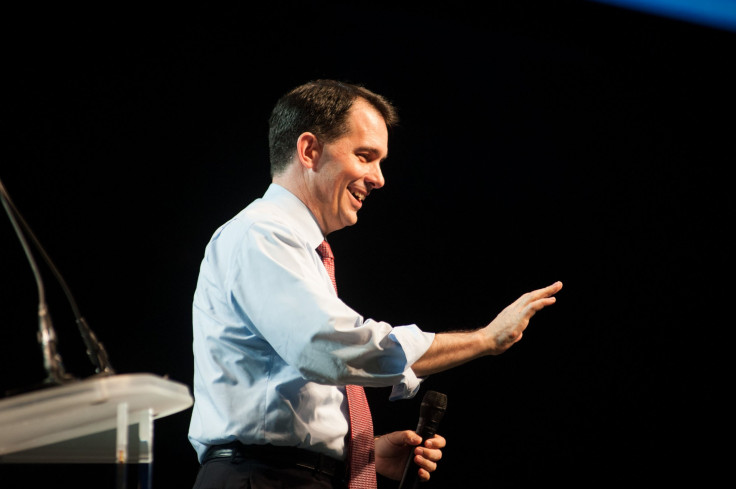Election 2016: Scott Walker Boosted By Iowa Evangelical Roots, Recall Election

WASHINGTON – Scott Walker enters the 2016 GOP primary contest in one of the most desirable positions. He’s coasting along in the top tier in the national polls and winning most polls in Iowa, which points to the most likely path for victory of the Wisconsin governor.
For Walker, much of his strategy is based on Iowa, neighbor to his home state. Iowa holds the nation’s first contest – a caucus that requires voters to show up at a particular spot at an exact time. The Republican base there tends to be more conservative and evangelical than the rest of the nation’s GOP.
Winning Iowa is never enough to take the nomination. Rick Santorum and Mike Huckabee won the last two contests there and got nowhere near the nomination.
But winning Iowa can provide momentum for a candidate going into New Hampshire, the first primary state, and South Carolina, which goes next. And with the Republican field so crowded going into 2016, finishing in the top two or three in each early state will be critical to staying in the race.
And Walker carries several advantages into the Iowa competition.
He Started Early
Walker got a head start on working the ground in Iowa before many of the other Republicans. He benefited from being from a neighboring state and has spent considerable time on the ground there since he wrapped up his re-election campaign in November 2014.
Iowa is the kind of state that demands candidates to show up and meet voters face to face. Santorum, a former senator from Pennsylvania, was able to win in 2012 by spending an immense amount of time campaigning in the state. He visited all 99 counties, at times traveling by himself in his pickup truck.
“While Walker enters the race next week formally, he actually has been in it informally or unofficially at least since last fall,” said Dennis Goldford, a political science professor at Drake University in Des Moines. “Recall the quote attributed to Woody Allen: Eighty percent of life is just showing up. Walker has been showing up.”
He Battled The Unions
When Walker became governor in 2011, he immediately staged a battle to the death with Wisconsin's public employee unions. After weeks of huge protests in Madison, he won. The raucous struggle made national news, and the world watched as a newly elected governor stood his ground.
Fighting labor unions is a great talking point for a Republican primary, and made him a national hero for the right. Democrats, public employee unions and their supporters rounded up enough signatures to have Walker recalled in 2012, forcing him to run for governor three times in four years. He won all three times.
“The 2012 recall election put Walker on a national stage,” said Barry C. Burden, the director of the Elections Research Center at the University of Wisconsin. “He is perceived by supporters as defeating public sector unions and other Democratic interests in a state with a long history of union activism.”
He Raised Money
Walker’s struggles with the unions in Wisconsin have paid off big-time in raising money as well. While he is unlikely to rival Jeb Bush – who raised more than $100 million for his super PAC – he won’t be scrimping for cash either.
Running three campaigns in four years is expensive. And as a result, the governor built a sizable national donor base. He was able to outraise his opponents in each contest. Donors tend to be loyal. And while many who backed Walker's gubernatorial campaigns may go elsewhere in the GOP primaries, cultivating that kind of base can pay dividends.
In particular, Walker is considered to be the favorite candidate of the billionaire conservative brothers Charles and David Koch. While the brothers haven’t yet said whether they will throw any of their sizable fortune behind Walker, their backing can still bring in funds for him. For Koch-aligned donors – especially those who can’t write million-dollar checks but can still chip in sizable contributions – backing Walker in the primary is a way to get in on the ground floor.
His Iowa Roots
Iowans have a soft spot for locals. And Walker can boast his own ties to the Hawkeye State. Born in Colorado, he lived in Plainfield, Iowa, from age three to 10 before moving to Wisconsin in 1977.
The proximity also helps Walker. He can travel to Iowa easily, quickly and cheaply. And residents of eastern Iowa see news coverage from Wisconsin.
Walker also inroads with the state’s sizeable evangelical population, which is key in Republican caucuses. His father was a Baptist preacher. And Walker himself talks about his religion.
“Walker has strong Tea Party credentials along with evangelical roots,” said Robert Alexander, a political science professor at Ohio Northern University. “This combination is quite appealing to GOP primary voters.”
© Copyright IBTimes 2025. All rights reserved.






















